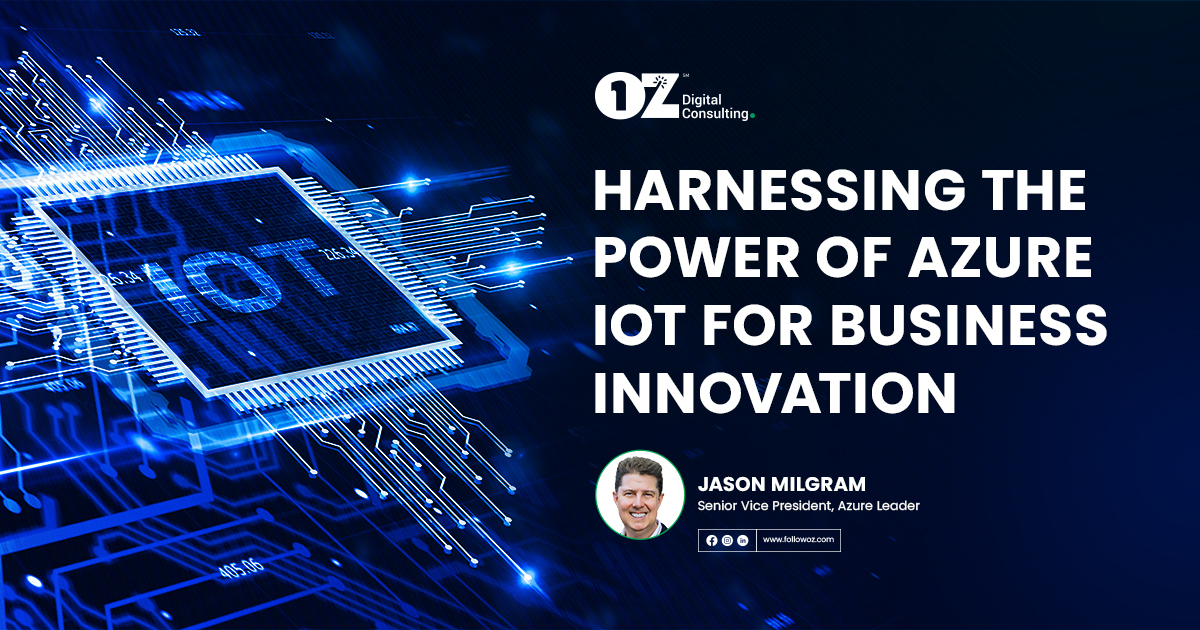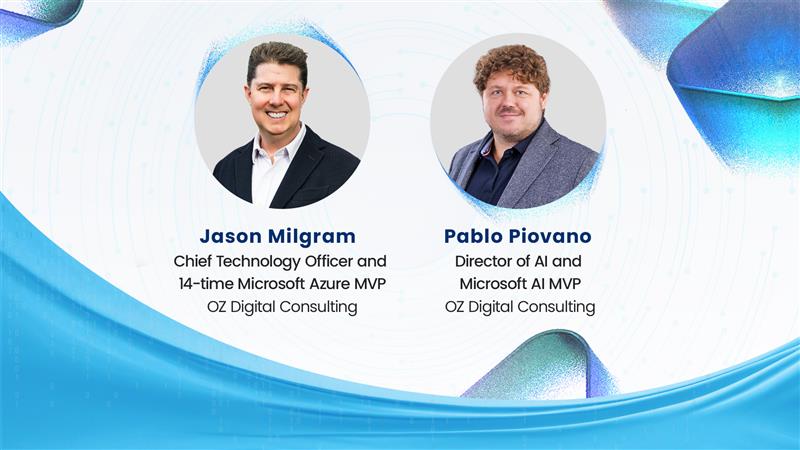By Jason Milgram, Senior Vice President, Azure Leader
IoT refers to a network of physical devices interconnected and exchanging data, from simple sensors to smartphones and wearables. This technology has revolutionized how businesses operate, offering unprecedented data collection, real-time analytics, and process automation. In today’s competitive business environment, IoT is a cornerstone technology that drives efficiency, enhances customer experiences, and opens new revenue streams, making it an essential tool for business growth and adaptation.
Azure IoT, a suite of services Microsoft provides, offers a comprehensive platform for businesses to implement and manage their IoT solutions. By combining cloud storage, analytics, and networking capabilities, Azure IoT provides a reliable and scalable framework that enables businesses to gather, process, and analyze vast amounts of data generated by their IoT devices. This platform’s significance lies in its ability to facilitate seamless integration, robust security, and insightful data analytics, which are crucial for businesses to make informed decisions.
The primary goal of this article is to guide business leaders in understanding the potential of Azure IoT in transforming their operations. We aim to provide a clear and comprehensive overview of how Azure IoT functions, its benefits, and practical applications in various industries. By the end of this article, decision-makers will be equipped with the knowledge to assess how Azure IoT can be integrated into their strategic planning to drive innovation, efficiency, and growth in their organizations.
The Evolution of IoT in Business
The journey of IoT in the business world began with RFID tags and basic sensors, which opened up new pathways for data collection and automation. Initially, its application was limited to tracking and managing inventory. However, as technology evolved, so did the scope of IoT.
Businesses started incorporating more sophisticated IoT devices, enhancing connectivity and data exchange across various operations. This evolution marked a transition from basic automation to advanced analytics and real-time decision-making, redefining how businesses interacted with their physical environment.
Today, IoT is at the forefront of technological innovation. Current trends include the integration of AI and machine learning with IoT devices, enhancing the capability to analyze and derive meaningful insights from vast datasets. Another significant trend is the development of edge computing, which processes data closer to where it is generated, reducing latency and bandwidth use. IoT has expanded into more sectors, including smart cities, healthcare, and industrial automation, offering more comprehensive and customized solutions. The focus on security has intensified, with robust protocols being developed to safeguard the intricate networks of IoT devices.
Azure IoT is pivotal in shaping the future landscape of business operations. Its cloud-based platform offers scalability and flexibility, allowing businesses to adapt swiftly to changing demands. Azure IoT also integrates seamlessly with other Microsoft services like AI and Machine Learning, providing businesses with powerful tools to analyze and act on data more efficiently. Looking ahead, Azure IoT is set to play a crucial role in developing smart infrastructures and autonomous systems, marking a new chapter in the digital transformation journey. By offering advanced security features and compliance protocols, Azure IoT ensures that businesses can harness the power of IoT innovation while maintaining data integrity and trust.
Understanding Azure IoT
Azure IoT offers a robust suite of services and solutions designed to cater to various business needs in the IoT landscape. At its core, Azure IoT provides IoT Hub, a central message hub for bi-directional communication between IoT applications and the devices they manage. Azure IoT Edge extends cloud intelligence and analytics to edge devices. Azure IoT Central, a fully managed SaaS solution, offers user-friendly interfaces and tools for device management and monitoring. Additionally, Azure IoT includes solutions like Azure Sphere for secure IoT device development and Azure Digital Twins to create digital representations of real-world environments.
Key Features of Azure IoT
- Security – Azure IoT prioritizes security at every layer offering comprehensive features like secure boot, BitLocker encryption, and a defense-in-depth approach to safeguard against various threats.
- Scalability – With Azure’s global infrastructure, Azure IoT can scale to accommodate the growing number of IoT devices and the data they generate, ensuring consistent performance regardless of load.
- Integration Capabilities – Azure IoT excels in its ability to integrate with other Azure services like Azure AI and Analytics and external applications, enabling businesses to build and tailor comprehensive IoT solutions that align with their specific needs.
Compared to other IoT platforms, Azure IoT stands out for its seamless integration with a broad range of Microsoft products and services, which can be a significant advantage for businesses already using the Microsoft ecosystem. While platforms like AWS IoT and Google Cloud IoT also offer powerful features and scalability, Azure IoT distinguishes itself with its strong emphasis on enterprise-grade security and compliance standards, crucial for businesses handling sensitive data. Additionally, Azure’s global reach and extensive network of data centers provide a competitive edge regarding reliability and data residency options, making it a compelling choice for international operations.
Business Benefits of Azure IoT
Azure IoT enables businesses to enhance their operational efficiency and productivity significantly. By leveraging IoT devices and sensors, companies can automate routine tasks, monitor real-time equipment performance, and predict maintenance needs. This proactive approach minimizes downtime and extends the lifespan of equipment. Additionally, integrating Azure IoT with existing business systems streamlines processes, reduces manual workload, and allows employees to focus on more strategic tasks, thus boosting overall productivity.
One of the most significant advantages of Azure IoT is its capacity to support data-driven decision-making. The platform’s advanced analytics tools process large volumes of data generated by IoT devices, transforming it into actionable insights. Businesses can use these insights to optimize operations, reduce costs, and identify new market opportunities. Azure IoT’s predictive analytics capabilities also enable companies to anticipate market trends and customer needs, ensuring they stay ahead of the competition.
Azure IoT plays a crucial role in enhancing customer experiences and engagement. By collecting and analyzing data from various touchpoints, businesses can better understand customer behavior and preferences. This knowledge allows for creating personalized experiences, targeted marketing campaigns, and improved product offerings. IoT technology also enables real-time customer interaction, fostering a sense of connection and responsiveness that enhances customer satisfaction and loyalty.
Case Studies: Successful Azure IoT Implementations in Various Industries
- Manufacturing – A leading automotive manufacturer used Azure IoT to create a connected factory. This implementation resulted in a 30% reduction in downtime and a 25% increase in production efficiency.
- Retail – A global retail chain implemented Azure IoT for inventory management and customer behavior analysis. The result was a 20% increase in inventory accuracy and a 15% growth in sales due to targeted marketing strategies.
- Healthcare – A healthcare provider utilized Azure IoT for remote patient monitoring and predictive healthcare analytics. This led to a 40% decrease in emergency room visits and significantly improved patient outcomes.
- Agriculture – An agricultural company adopted Azure IoT for precision farming, using sensors for soil moisture and nutrient monitoring. This resulted in a 20% increase in crop yield and a 10% reduction in water usage.
These case studies demonstrate the versatile application and substantial benefits of Azure IoT across different sectors, highlighting its potential to revolutionize business operations and drive innovation.
Implementing Azure IoT in Your Business
The first step in implementing Azure IoT is identifying specific business needs and potential applications for IoT technology. Companies should evaluate their operations to pinpoint areas where IoT can bring the most value, such as process automation, real-time data analysis, or customer experience enhancement. This assessment should also include identifying key performance indicators (KPIs) that IoT solutions can impact. Engaging with stakeholders across different departments can provide a comprehensive view of where IoT can be most effectively utilized.
Once the areas of potential IoT application have been identified, the next step is to plan and strategize for its integration. This involves:
- Defining Objectives – Clearly outline what you want to achieve with IoT technology, such as reducing operational costs, improving product quality, or enhancing customer satisfaction.
- Technology Assessment – Evaluate existing IT infrastructure and determine the upgrades needed to support IoT solutions.
- Risk Management – Identify potential risks and challenges associated with IoT implementation, including security concerns, data privacy issues, and ensure compliance with relevant regulations.
- Roadmap Development – Create a phased implementation roadmap outlining the IoT project’s timeline, budget, and resource allocation.
Using Azure IoT and working with a partner on your business implementation offers numerous services and support options:
- Consultation and Planning Support – Partner organizations provide expert consultation to help businesses plan and design their IoT solutions effectively.
- Technical Support and Training – Microsoft and partner organizations offer technical support and training resources to ensure your team is well-equipped to manage and maintain IoT solutions.
- Customizable Solutions – Azure IoT services are highly customizable, allowing businesses to tailor solutions to their specific needs and objectives.
- Security and Compliance Assistance – Azure provides robust security measures and compliance support to ensure your IoT solutions meet industry standards and regulations.
- Scalability and Flexibility – Azure IoT solutions are scalable and flexible, ensuring they can grow and adapt to your business needs.
- Analytics and Insights Services – Leverage Azure’s advanced analytics capabilities to gain insights from your IoT data, helping you make informed business decisions.
By following these steps and utilizing the services and support offered by Microsoft and partner organizations, businesses can effectively implement IoT solutions that drive innovation and create a competitive edge in their respective industries.
Overcoming Challenges and Mitigating Risks
Security is a paramount concern in IoT deployments due to the increased vulnerability of a vast network of connected devices. To address these concerns, businesses should adopt a multi-layered security approach. This includes securing the devices, the data they transmit, and the networks they connect to. Utilizing Azure IoT’s built-in security features like secure boot, bi-directional authentication, and regular security patches is essential. Additionally, regular security audits and updating the latest security protocols can significantly reduce vulnerabilities.
Data privacy and compliance are critical, especially with regulations like GDPR and HIPAA. Businesses must ensure that their IoT solutions comply with these regulations. This involves implementing strict data governance policies ensuring data is collected, stored, and used in compliance with legal standards. Azure IoT provides tools and guidelines to help businesses manage data effectively while adhering to privacy laws. Regular employee training on data handling best practices and privacy policies is also crucial in maintaining compliance.
Implementing IoT solutions often involves overcoming technical and organizational challenges. Ensuring interoperability between IoT devices and existing IT infrastructure is crucial. This requires a thorough evaluation of the current IT landscape and the selection of compatible IoT technologies. Azure IoT offers a range of solutions that can be integrated with various platforms, aiding in this process. Organizationally, fostering a culture that embraces change and innovation is essential. This can be achieved through continuous training and involvement of all stakeholders in the IoT implementation process. Clear communication of the benefits and strategic objectives of IoT initiatives can also aid in overcoming resistance and ensuring a smooth transition.
By effectively addressing these challenges and mitigating risks, businesses can ensure a secure, compliant, and successful implementation of Azure IoT solutions, unlocking new opportunities for innovation and growth.
Conclusion
As explored throughout this article, Azure IoT is a pivotal technology for modern businesses, across sectors with the ability to enhance operational efficiency, enable data-driven decision-making, and improve customer engagement. The diverse range of Azure IoT services and solutions, coupled with its robust security and scalability features, positions it uniquely to address the dynamic needs of contemporary business environments.
Embracing IoT, particularly Azure IoT, is not just about adopting new technology; it’s about embracing a strategic tool for business growth and innovation. Integrating IoT into business operations opens avenues for enhanced productivity, streamlined processes, and deeper insights into customer behaviors and market trends. As the business landscape evolves, IoT is critical to staying competitive and relevant.
For business decision-makers looking to embark on the Azure IoT journey, the first step is to clearly understand your organization’s specific needs and how IoT can address them. Engage with key stakeholders to align IoT initiatives with broader business objectives. Next, consider partnering with Azure experts to gain insights into the best IoT solutions for your business. Utilize the wealth of resources and support offered by Azure IoT to navigate the initial stages of implementation. Finally, prioritize security, compliance, and staff training to ensure a successful and sustainable IoT deployment.
Integrating Azure IoT into your business strategy is a technological upgrade and a strategic move towards future-proofing your organization. By taking proactive steps today, you can position your business to reap the substantial benefits of IoT in the evolving digital landscape.
Ready to learn more? Contact us today.
References:
“The Azure IoT Handbook” by Dan Clark is an essential resource for those looking to deepen their understanding of IoT systems, particularly those deployed on Azure. The book offers a comprehensive introduction, covering the basics of IoT, common Use Cases, and the components of an IoT system. It addresses the complexities of IoT deployment’s device and cloud sides, emphasizing the importance of security. With real-world examples and practical guidance, it’s an invaluable guide for developers and architects working with Azure IoT solutions. More information about the book can be found on Packt’s website: https://packt.link/5cwJ8
Microsoft documentation
– IoT concepts and Azure IoT Hub https://learn.microsoft.com/en-us/azure/iot-hub/iot-concepts-and-iot-hub/?WT.mc_id=AZ-MVP-4029307
– What is Azure IoT Central? https://learn.microsoft.com/en-us/azure/iot-central/core/overview-iot-central/?WT.mc_id=AZ-MVP-4029307
– Evaluate your IoT Scenario by using Azure IoT Central https://learn.microsoft.com/en-us/training/paths/evaluate-iot-scenario-with-iot-central/?WT.mc_id=AZ-MVP-4029307



